Native American Tribes Create Financial Empires in Booming Cannabis Industry
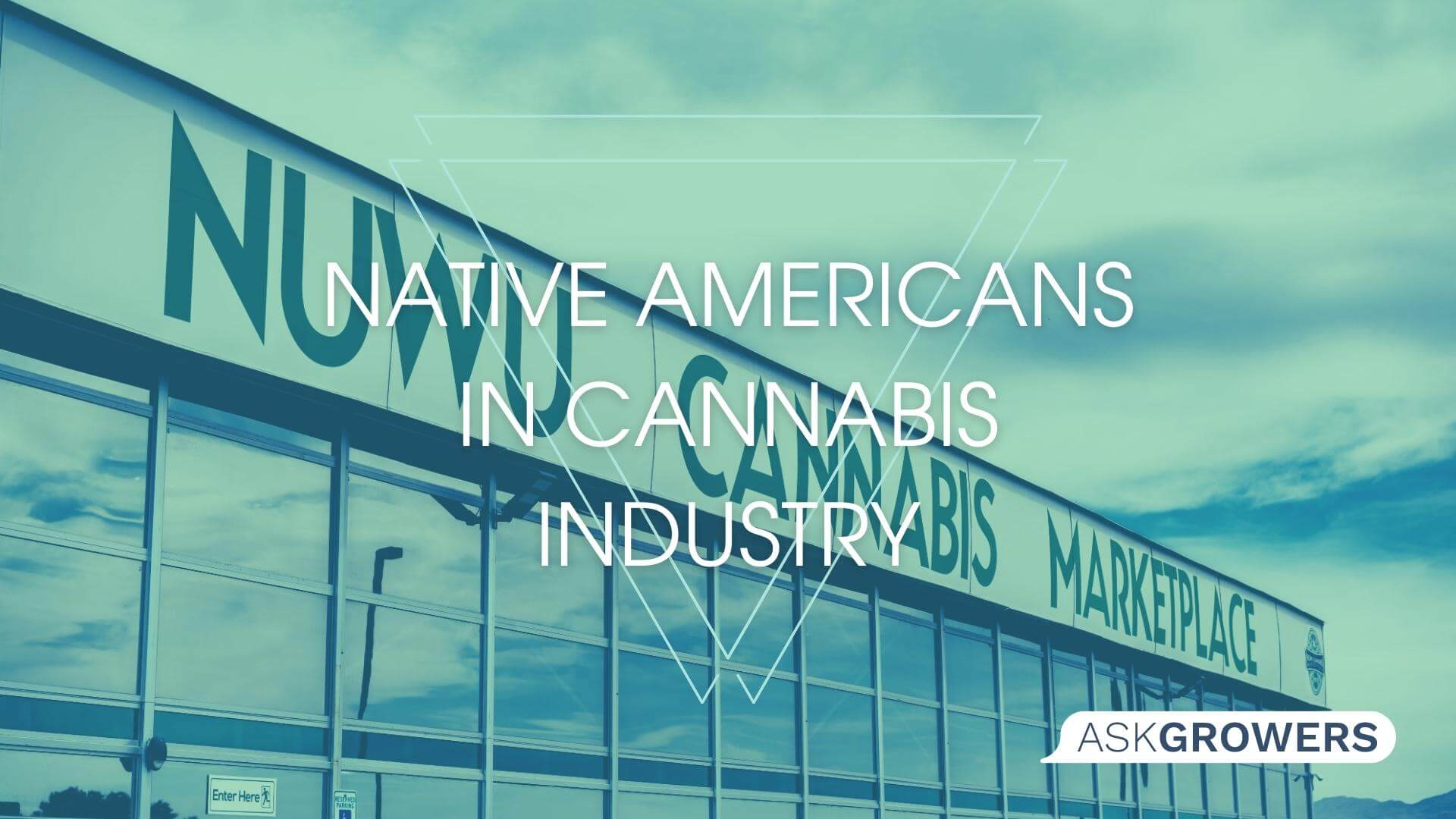
Curtis Anderson stands outside the world’s second-largest cannabis dispensary, located in Southern Nevada. He motions toward a snow-covered mountaintop some 25 miles in the distance.
“We got another one up there,” he says with a chuckle, referring to a second dispensary near the base of the mountain. “It’s not as big but it’s always full.”
Anderson is serving as the chairman of the Las Vegas Paiute Tribe for the fourth time in his 75 years on this planet. A former high school bus driver, he’s now the head of a legal marijuana juggernaut — NuWu Cannabis Marketplace — that brings in over $5 million in sales per month. And he’s by no means alone in this lucrative endeavor.
As more states defy federal authorities with legal weed, Native American tribes have been big winners as well as unsung heroes in advancing the industry. Their history with the plant is debated and relatively undocumented — some reports claim tribes’ familiarity with the plant dates back to pre-colonial times, while others allege European settlers introduced the plant.
But a couple things are for certain: the present is booming and the sky’s the limit for the future.
An Emerald in the Desert
A long wooden checkout desk stretches from one side of the massive 15,800 square-foot NuWu Cannabis Marketplace to the other side, and steady streams of water cascade down a pair of glass walls into large marble basins. Over 3,500 visitors pass through the dispensary doors each day on average, and a 24-hour drive-through window welcomes another 500 daily customers.
Opened in October 2017 on tribal land near downtown Las Vegas, NuWu was the largest marijuana store in the world before another Las Vegas store — Planet 13 — debuted a year later.
Anderson and the Paiutes in 2019 celebrated the grand opening of a second, smaller dispensary — Nuwu North — near the tribe’s golf resort by the mountain. Like the flagship store, NuWu North also features a 24-hour drive-through.
The Paiutes also debuted separate cultivation and production facilities in early 2020, and currently employ about 200 people as its marijuana empire continues to grow.
“It’s been great for us,” Anderson said of selling cannabis. “I’m most proud of the jobs we’ve created and the access we’ve given people to medicine.”
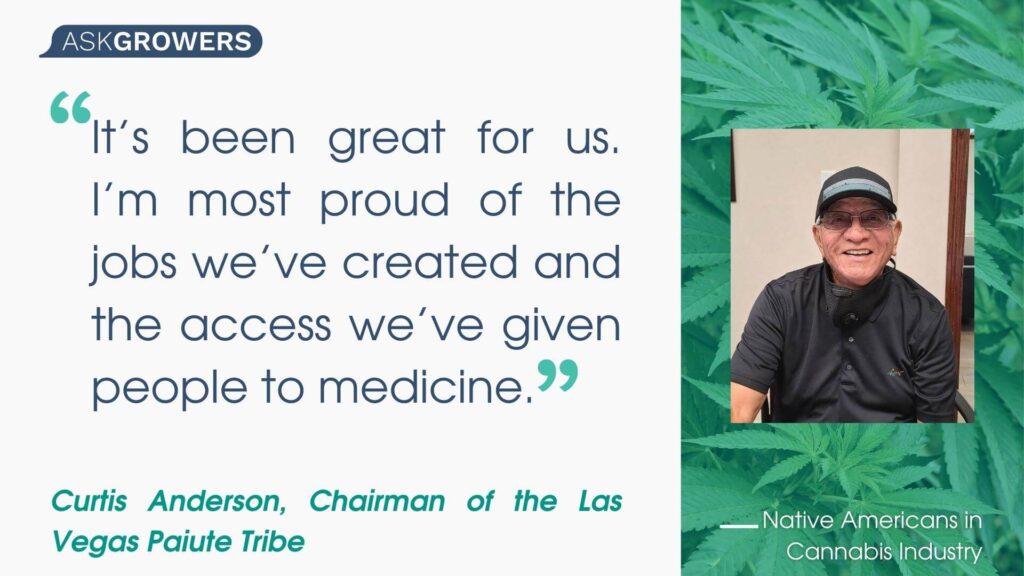
Only 10 of the tribe’s 63 members work full 40-hour weeks at the dispensary — the rest of NuWu’s employees come from outside the tribe. But its profits are earmarked for the Paiutes’ general fund, which supports the medical and educational expenses of the tribe’s members as well as future business investments.
A New York Cannabis State of Mind
Like Anderson and the Vegas Paiutes, the St. Regis Mohawk tribe in New York is also ahead of the curve when it comes to selling weed. Located near the northern U.S. border with Canada, the tribe’s remote reservation is home to a number of legal adult-use dispensaries — some running out of facilities as small as glorified converted shipping containers.
Not all members of the St. Regis Mohawks are on board with the idea of cannabis. But they’re winning customers by the thousands as hosts of the only marijuana stores within several hours’ drive. New York legalized recreational cannabis in March, but has yet to begin licensing dispensaries to open.
Many tribal members are also involved as financial partners with the local dispensaries, so a large percent of the St. Regis Mohawks are logically happy to have the extra business on their land.
“It’s a matter of bringing commerce and economic activity to the area,” said tribal member William Roger Jock. “If we don’t, we’re setting ourselves up to fail.”
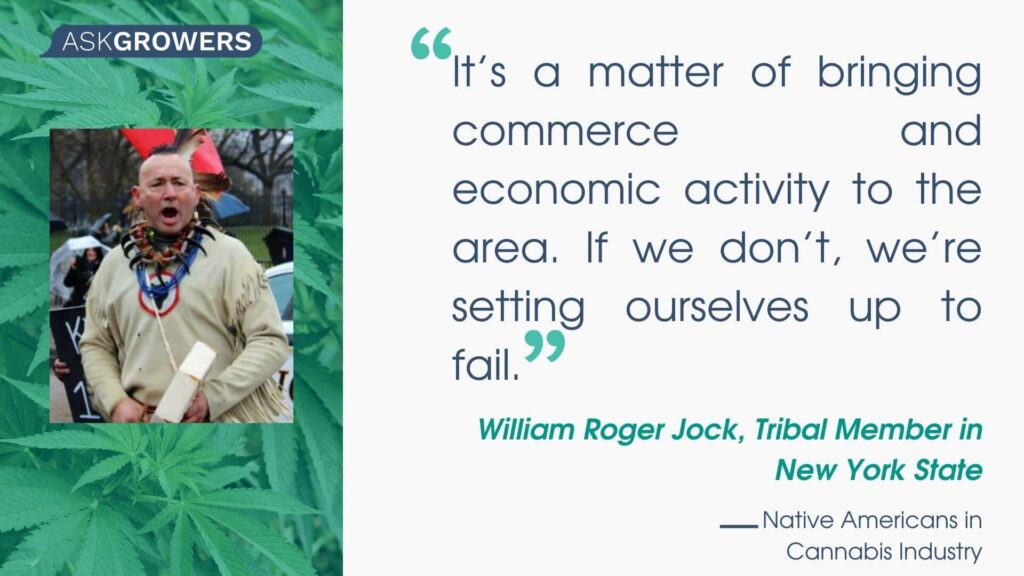
For the St. Regis Mohawks, the cannabis plant is especially valuable after the harrowing financial impact created by the pandemic. Last year, the Akwesasne Mohawk Casino Resort — which has driven hundreds of millions of dollars in revenue since opening in 1999 and employs more tribal members than any other business on the reservation — closed for nearly six months.
Jock estimated the tribe lost $30 million from the casino shutdown. Business since then has also been brutally slow, with border closings preventing Canadian tourists from visiting.
Traditional Revenue Streams Drying Up
Tribes have traditionally made the most of their exclusive permission to offer gambling in many states to raise revenue. Those proceeds helped pay for a host of basic tribal needs, including education, healthcare and professional development.
As federal gambling prohibition in the United States remained relatively consistent through the second half of the 20th century, casinos became a wonderfully lucrative way for tribes across the U.S. to improve their finances (except in Nevada, parts of New Jersey and Louisiana where state and local authorities also let non-tribal companies offer gambling).
But the feds have slowly relaxed gaming laws in recent years and gaming revenue has been incredibly volatile. In response, many Native American leaders have decided to diversify their tribes’ business portfolios.
Another huge tribal revenue source, tobacco shops, have also seen commerce wane as a result of federal anti-smoking campaigns. The Vegas Paiutes’ own a tobacco shop that still welcomes a U.S.-leading 1,300 customers per day, but Anderson said business has declined by about 35 percent since 2005.
“All this combines to the tribes losing money,” said Marlin Henderson, a PhD Native American studies professor at the University of Oklahoma. “The day when gaming and tobacco were no longer enough was inevitable, but I don’t think anyone imagined it’d arrive this fast.”
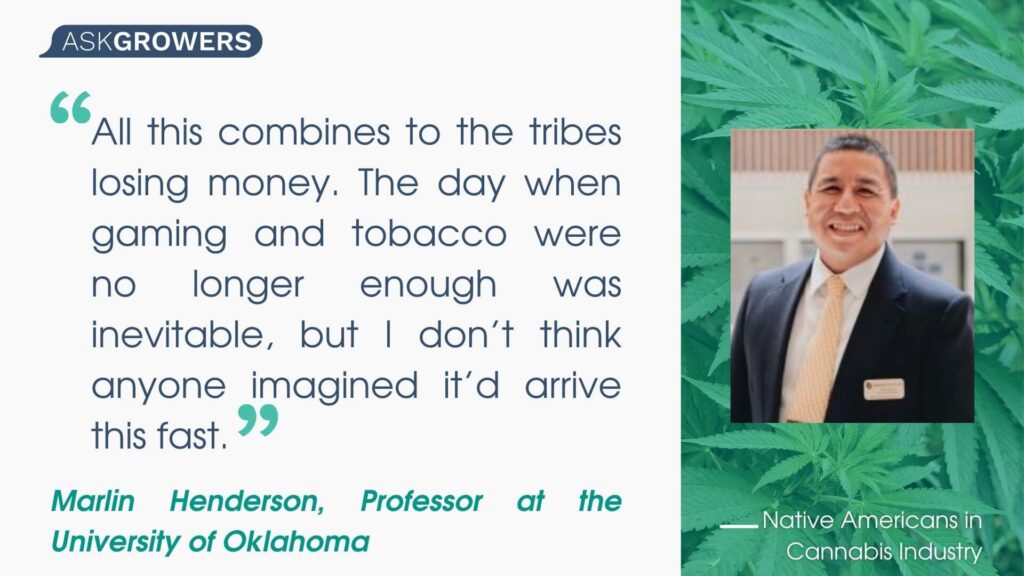
Impact Goes Beyond Just the Tribes
Many owners of dispensaries that compete with tribal marijuana operators in adult-use states like Nevada, Oregon, California, Washington and Colorado understandably object to the Native Americans getting a head start in the industry.
But the vast majority of producers and cultivators couldn’t be happier to see the tribes succeed. Why? The Native Americans’ success means lucrative deals.
As an example, NuWu carries over 1,000 different marijuana products from nearly all of the state’s 250 cultivation and production facilities. Former Paiute chairman Benny Tso said the tribe had written seven-figure checks for some of their product purchases.
A handful of cultivators and producers, which bled money fighting for only 50,000 state-registered cardholders during Nevada’s two years as a medical-marijuana-only state in 2015 and 2016, are now thriving thanks in part to giant purchases from the state’s largest tribal cannabis dispensary.
Jillian Nelson, vice president of operations at Evergreen Organix, has sold to NuWu since the Paiutes opened their first dispensary’s doors over four years ago. Nelson said NuWu has purchased nearly all of Evergreen’s products at some point, including vape pens, Rick Simpson Oil, chocolates and even flower. She called the Pauites an “ethical group of people to work with,” adding their presence is “very positive for the industry in general.”
Same for Thomas Calabrese, spokesman for Vegas-based producer and cultivator QualCan. The facility sells over a dozen combined flower, edible and concentrate products to the Paiutes, and Calabrese said the tribe’s business has helped QualCan – one of Nevada’s longest-licensed cultivators – maintain a healthy cashflow.
“They set the blueprint for the industry for how everybody should conduct business,” he said.
Read Also: Guide On Cannabis Growers: Who They Are And How To Become A Cultivator
Navigating the Political Waters
To sell weed, playing the political game is perhaps just as important for tribal leaders as making ends meet financially.
Cannabis is still federally banned — and while tribes are considered sovereign nations, they’re still ultimately regulated by the U.S. government. To circumnavigate U.S. bureaucracy, Native American leaders are successfully enlisting their respective state governments for help.
In Nevada, the Las Vegas Paiutes and then-chairman Benny Tso worked with the office of then-Gov. Brian Sandoval to pass Senate Bill 375 back in 2017. The landmark law opened the door for legal negotiations on the use and sale of marijuana on tribal lands, allowing the Nevada governor’s office to bypass federal laws that limit commerce talks between tribes and Congress.
In New York, Jock and several other St. Regis Mohawk members are opting to ask for forgiveness instead of permission. New York legalized the plant on March 31 and the tribal government followed on June 28.
Neither of the two laws offer significant guidance on the next steps. But most of the St. Regis Mohawks involved in the industry believed they had enough legal framework in place to at least get their adult-use stores up and running.
“If you sit around and wait, you’re going to miss out” Jock said. “We felt like we had what we needed.”
Mega-Financier Encourages Political Route
Behind more than a dozen tribal cannabis success stories in the U.S. is a capital investment manager from Portland, Oregon.
Kevin Clock and his firm Cascade Strategic Investments orchestrated NuWu’s success through both the lobbying efforts and by lending the money for the tribe to open shop. In exchange, Clock and CSI share in the lucrative tribal dispensaries’ profits.
Clock, who is also of Native American descent, helped hire the lobbying team that successfully urged Nevada politicians to pass SB 375. He then set up campaign donations worth tens of thousands of dollars to pro-cannabis politicians who could ensure the Paiutes and other tribes in Nevada were protected in their marijuana endeavors.
“The reality is you have to be out there shaking hands and making donations,” Clock said. “The tribes have had to take an active role in order to lead this industry.”
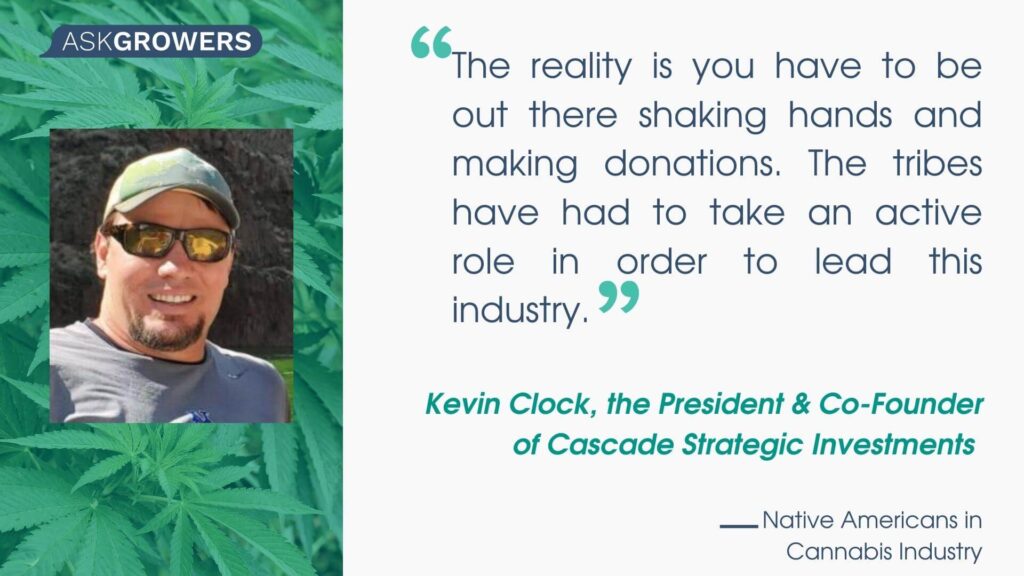
He’s also planning to fund a pair of new mega-dispensaries on tribal lands in Connecticut and North Carolina, the latter of which plans to set new records for biggest size when completed in late 2022 or early 2023.
A spokesman from the Eastern Band of Cherokee Indians in North Carolina and tribal members from the Mashantucket Pequot Tribal Nation in Connecticut each confirmed plans for marijuana palaces that will exceed 25,000 square feet. To do that, Clock said, he’s pushing similar versions of Nevada’s SB 375 in a number of cannabis legal states. He’s already backed a comparable bill-made-law in New Mexico.
“It’s essentially wash, rinse and repeat,” Clock said. “Federal prohibition has been a huge roadblock for the industry, but ironically it’s working in our favor.”

 Industry
Industry

.jpg)





 (1).png)






Be the first and share your opinion
Write a Review